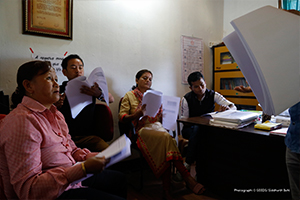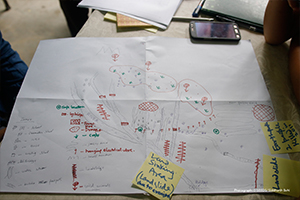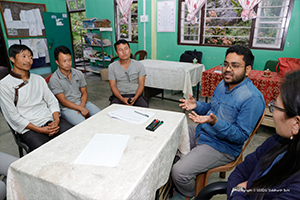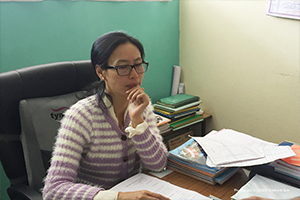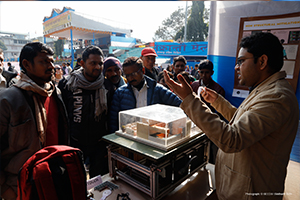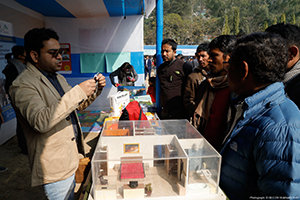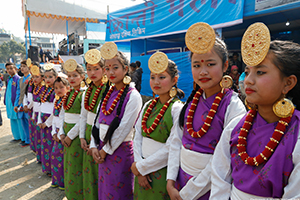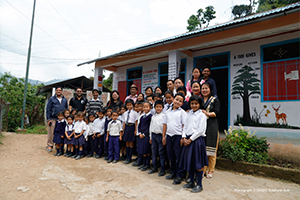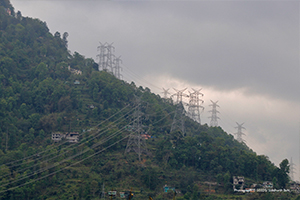NMHS
Sikkim is a small state that lies in the North eastern Himalayas with sharply defined and extremely steep slopes. The state has a long history of meteorological and hydrological disasters which has affected the state. The state witness’s high rainfall, extreme weather events, natural calamity and winter droughts to name a few. The geography, climate and elevation with haphazard development and urbanization make the State vulnerable to the multiple risks and hazards. .
IIPA in collaboration with SEEDS Technical Services is implementing a project on “Capacity Building Strategies for managing Complex Disasters in the face of Climate Change”. The goal is to design safe and sustainable capacity building strategies in ecologically fragile Himalayas in the face of climate change. It also aims to capacitate the different stakeholders ranging from schools, local Panchayats and the various line departments in the state to develop strategies reflecting potential plans for Complex Disaster management, implementation of Disaster Risk Reduction (DRR) and Climate Change Adaptation (CCA). As Climate has a huge influence on complex disasters, analysis of climatic parameters and establishing their linkages with disasters was conducted. For this, climate data was collected mainly from IMD, Pune besides other local and regional research centres. Various climatic parameters such as mean maximum temperature, mean minimum temperature, total rainfall in a month, number of rainy days, wind speed etc. were analysed to study climatic variations . The trends which reflect the potential risks in the future would also be analysed. The project objectives include developing, designing and identifying suitable mode of sustainable development in the face of Climate Change threat. .
The deliverables for the second year consisted of imparting our findings and involvement of government official and PRI members and local people in the state. This has been achieved by the state level workshop conducted in May, the one day seminar on disaster risk reduction in September and the two local level trainings conducted in the East and South districts of Sikkim in the month of October. The dissemination of knowledge among locals at large scale is efficiently done in the Maghey Mela in the month of January, 2019. Besides this the project also published papers on the research work done under the project and new innovative ways to track the community risk registers filled by the locals as a part of the project’s key policy interventions required for redesigning development for a sustainable future.
Community Risk Register (CRR)
Community Risk Register (CRR) is a public document prepared by the local government which provides an overview of the potential risks in the community which can lead to a disaster. It provides information on the emergencies that can happen in the community, together with an assessment of how likely they are to happen and the impacts if they do. It is designed to inform people about the risks that could occur where they live, so they can think about what they can do to be better prepared in their homes, communities and businesses. The register also serves as a knowledge base for development planning works.
Looking at all of the risks together can also help emergency services, local authorities and other organizations plan their joint response. The CRR aims to help these agencies make decisions on emergency planning work, and will help them develop better relationships whilst considering their resources and capacities.
The register has been published in response to the mandates given under chapter 6 of the Disaster Management Act, 2005, which mandates local authority to take measures as necessary for disaster management. Further information can be accessed through the Sikkim State Disaster Management Authority (SSDMA) website
Climate School
A Climate school as a concept works towards sensitizing the school children towards Climate change in a practical manner. The objective of the exercise is to sensitize the school students about the effects of climate parameters and to instill a curiosity in the young minds to know about the various facets of climate science.
As Climate has a huge influence on complex disasters, measuring of climatic parameters and establishing their linkages with disasters can be done in order to sharpen the knowledge of complex disasters. The climate school aims to record daily weather data through the students for six parameters. These parameters include maximum and minimum temperature, humidity, wind direction, wind speed, rainfall and atmospheric pressure.
The school selected for this pilot project was the Govt. Junior High School, Upper Syari, Deorali, Gangtok. The school is located in the main city and the proximity to the amenities is more. A training session with seventh grade students was conducted for awareness of school students about climate change and weather instruments. The various parameters for monitoring weather were discussed with the students and the operation of the instruments was shown and explained to them. A group of six students was selected to record weather data from the instruments for a period of one month. After that another group of six students would be selected from the class to record the data. This was planned such that each student gets accustomed to use the instruments.
After that the selected group of six students was taught on how to operate the instruments and take the readings. The student practiced and took reading from the instruments and recorded in the register. A weather information board by the name of ‘Weather Watch’ was also put up at the school which displays daily weather data and monthly average weather data for the last month for the recorded parameters.
A teacher was nominated by the school to supervise this activity and act as in-charge of the data recording session. The teacher also acts as a link between the project and the students. They are responsible for the maintaining of the register of daily recordings.
As a means to generating awareness, the climate school demonstrates the actual variation in the weather conditions by measuring the local weather parameters of the area where the school is situated. In this manner the students get a quantitative idea of how the weather varies during seasons. The study does not use the data recorded by the students for any research purpose as the objective of the exercise is to make children better understand the parameters that affect the weather of their city in the backdrop of complex disasters.
Maghey Mela
Jorethang Maghey Mela is one of the largest Mela in Sikkim celebrated in the month of January every year and is one of the state level events. Countless tourists from every corner of the globe gather at this festival and part of it. The varied Cultural programmes, ethnicity, traditional dance, cuisines, arts and handicrafts of Sikkim are showcased at the Mela. Project “Capacity Building Strategies for Managing Complex Disasters in the face of Climate change” funded by National Mission on Himalayan Studies- Ministry of Environment Forest and Climate Change, Government of India (NMHS-MoEF&CC, GoI), led by Indian Institute of Public Administration (IIPA) and SEEDS Technical Services (STS) in collaboration with Sikkim State Disaster Management Authority(SSDMA) also represented at the events with a stall where Climate and Disasters related games, Shake table for earthquake demonstration were given to the public
Maghey Mela 18
Maghey Mela 19
School Risk Register (SRR)
School Risk Register provides information on the emergencies that can happen in and around the school, together with an assessment of how likely they are to happen and the impacts if they do. It is designed to inform school authority about the risks that could occur, so they can think about what they can do to be better prepared. The register also serves as a knowledge base for development planning works of the school.
Looking at the risks together can also help in response planning for emergency. The School Risk Register aims to help school authority make decisions on emergency planning work, and will help them develop better relationships whilst considering their resources and capacities.
The school risk assessment committee is responsible for preparation of School Risk Register. The School Risk Assessment Committee convenes for a meeting at regular intervals as decided by them to prepare/revise the school risk register.
Blended Capacity Building Programme for Senior Level Officers
Blended Capacity Building Programme for senior level officers was conducted from 12th to 16th March, 2019. This programme was successfully executed in association with School of Disaster Management, Centurion University of Technology and Management (CUTM), Odisha.
The programme was designed for the senior level officers of different state departments of Odisha. Officers from different departments viz., Odisha State Disaster Management Authority (OSDMA), Water resources department, Steel and Mines Department, Energy Department, Flood control and Basin Department, etc., actively participated and appreciated the concept of blended learning.




